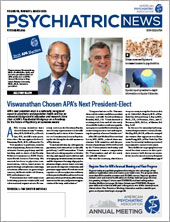Panelists to Discuss Strategies to Protect Women’s MH
Information & Authors
Information
Published In
History
Keywords
- APA Annual Meeting
- 2023 Annual Meeting
- San Francisco
- Challenges in promoting mental health
- Women’s mental health
- Gender
- Abortion
- Reproductive rights
- Women and girls
- Bodily autonomy
- Transgender care
- Gender-affirming health care
- Transgender women and girls
- Climate change
- Climate and women
- Latinx and Black communities
- Disaster policies
- Substance use
- Domestic violence
- Coerced or forced pregnancy
- Evan Eyler
- Robert Larner
- Carole Warsher
- Leslie Gise
- Amanda Koire
Authors
Metrics & Citations
Metrics
Citations
Export Citations
If you have the appropriate software installed, you can download article citation data to the citation manager of your choice. Simply select your manager software from the list below and click Download.
For more information or tips please see 'Downloading to a citation manager' in the Help menu.
View Options
View options
Login options
Already a subscriber? Access your subscription through your login credentials or your institution for full access to this article.
Personal login Institutional Login Open Athens loginNot a subscriber?
PsychiatryOnline subscription options offer access to the DSM-5-TR® library, books, journals, CME, and patient resources. This all-in-one virtual library provides psychiatrists and mental health professionals with key resources for diagnosis, treatment, research, and professional development.
Need more help? PsychiatryOnline Customer Service may be reached by emailing [email protected] or by calling 800-368-5777 (in the U.S.) or 703-907-7322 (outside the U.S.).
